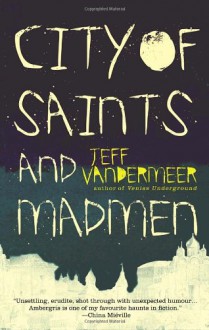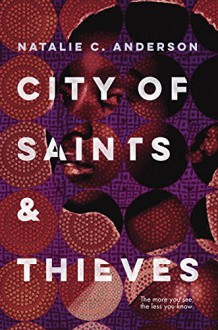
Sometimes it doesn't matter what you hear about a book, all the promise described in glowing reviews--it doesn't matter who suggests it, on what authority or with what arguments. Sometimes, you're still going to come out the other side disappointed, confused how this could possibly be the book you had heard about, trying to reconcile the words of friends and fellow reviews with what you find on the page.
I'm there again. There's something in it reminiscent of the moment after a car accident, where you're sitting there in disbelief, trying to make sense of it, half laughing, half shaking your head.
It's not that I don't see it--the book certainly has the right markers: the self-awareness, the meta-fictions, the ironies and self-contradictions, the allusions and in-jokes, the big, rearing ugliness of modern literature. And yet to say that it has those markers doesn't mean much--it's like saying that a math book has equations, it doesn't mean that they add up to anything, that they're accurate.
Indeed, markers are the easiest things to fake--we all know what a piece of literature is supposed to look like, and so we can take the right words and the right techniques and include them. But of course, you can use a word without understanding its definition, and you can adopt a technique without ever considering why that technique is used.
The most obvious marker, at first glance, is the self-awareness of the text, what the kids these days call 'meta'--where not only are you writing, you're also commenting on the fact that you're writing, making jokes and references, reminding the reader of the artificiality of what they are reading.
It's a trick at least as old as Ariosto and Cervantes, but which has become especially popular in this Post-Modern Age of Skepticism. After all, we're not supposed to trust authority, we now take it for granted that the book is not the 'Logos', the Word of Truth, and so it makes sense for the author to step out occasionally and acknowledge that. And yet, since it is the default now, it's really not enough simply to be self-aware, just to poke at the fourth wall for the sake of doing it--that's played out.
Much of the self-awareness takes the form of a jokey, silly tone, and much like in Iain Banks, it seems to be an ill fit for otherwise dire and serious stories. More than that, VanderMeer is constantly harping on it without much payoff--there are some truly clever pieces of wit, here or there, but for every one that hits its mark, we have to wade through ten others that don't.
It starts to feel like being at a party with a guy who has to make some comment about everything, who keeps mentioning that people think he's funny, who tells you how funny his jokes are before he tells them, says 'wait for it!' before each punchline, and then explains the joke once it's done. In King Squid he writes:
“... six hundred continuous pages of spurious text that no true squidologist can read today without bleeding profusely from the nose, ear, and mouth.”
And it just feels like a bad internet comment--it's edgy, full of hyperbole, and so non-specific that it could have been appended to pretty much anything. That lack of precision makes humor impossible--because being funny means hitting your target right in the heart, not just pelting some refuse near it. From the same story:
“... the Society ... was unwise to choose as observers the Fatally Unobservant.”
The observers were unobservant. That's not even wordplay, it doesn't even reach to the level of the humble pun--and it's giving me unpleasant flashbacks to Discworld.
In his introduction, Moorcock compares VanderMeer to Peake, but he just lacks any subtlety, and it all smacks of trying too hard, just worrying incessantly at the edges until they all begin to fray. When he mentions the Borges Bookstore (on Albumuth Boulevard, natch), which he does in every story, it's a nudge that threatens to bowl the reader over, a wink by way of facial spasm.
It's not only with his jokes and allusions that VanderMeer leaves nothing to chance, he has characters tell us in footnotes when we are supposed to think they are funny, he mentions when a certain part is deliberately over-written, or that we shouldn't trust some character, or that this point-of-view shift indicates a change in the character's personal identity.
Yet this is a book that people say is challenging, is intellectual and mysterious, something you have to put together yourself, piece by piece. My idea of a challenging book is one that trusts the reader to come to their own conclusions, to figure out the themes for themselves, and to find humor where it lies, not one that leads them along by the hand. Sure, sometimes his instructions are contradictory--we're told at first that something is important, and later that it's not trustworthy--but the real problem is that we're being told outright at all.
A lot of this self-awareness takes the form of self-deprecation, as in this line:
"Throughout the story, X communicates to the reader "between the lines" in a rather pathetic manner. Such self-consciousness has clearly corrupted his writing."
But self-deprecation is only effective when it is honest, when it acts as a genuine reveal of character, not just a sarcastic defense mechanism--a schoolyard dodge, 'if I say it first, then they can't make fun of me for it'.
Self-awareness needs to be more than just a pose, because otherwise, you just fall into teenage rebellion, where it becomes an excuse, a crutch, a way of distancing one's self from the reader, and from judgment--'Yeah, I know--Did you think I didn't know that? Everyone knows that.' It becomes a crutch to fall back on, an attempt to regain some semblance of control, just like all the explanations of what the reader is supposed to be getting out of this.
Certainly, VanderMeer set himself a great task, and there's something admirable in that, but it isn't one of those great, inspirational 'troubled experiments', like Moby Dick or A Storm of Wings--in large part because Harrison manages to achieve in A Storm of Wings everything that VanderMeer can't seem to do here. However, Harrison always lets the story stand on its own, he gives no excuses, nor does he spell out what we're supposed to take away from the book.
It's a lesson all artists need to learn: if you're going to be brave and create something, then be brave all the way through. Don't stop halfway to explain yourself. When you hand off your work for others to enjoy, don't include qualifiers and excuses--even though the urge to do so will be strong. You have to let the work stand on its own, and if you aren't willing to do that, then don't take on a monumental task, because the meddling will ruin it.
And VanderMeer set a monumental task for himself--there are a lot of moving pieces here, and keeping them all spinning is a master's work. The structure itself is obsessed with metafiction, with all of these 'in-world' documents that are supposed to come together and produce a greater whole: a scientific article about squid, a series of art critiques, a pamphlet about the history of the city, an asylum doctor's interview, letters, a story written in secret code, and several more.
Yet, I rarely found that these metafiction elements were well-written enough to merit inclusion--they certainly paled in comparison to the pure fiction stories. Indeed, there seemed to be a sense that they were all extended jokes--in An Early History of Ambergris, the fact that there were more footnotes than actual text, and the same in King Squid, except this time it was the bibliography that was longer than the story, or in The Release of Belacqua , mocking the fact that art critics can often only guess at their subjects' motivations.
But all of these jokes relied on their great length, the need for the author to just keep at them, to keep extending them ever longer, which only actually works if the joke is funny enough in the first place to survive such a stretching on the rack. What marks great lengthy jokes is the author's ability to keep raising the stakes, to keep making things more ridiculous and involved, to drop the other shoe--and then another--until it's all piled on top of itself, redoubling its own absurd premise. Instead of this, VanderMeer keeps the same pace throughout, merely adding on more of the same, and so the last line holds no more humor than the first--indeed, rather less by way of attrition.
The central story that connects all of these it The Strange Case of X, which literalizes the fiction process, writing the author into the story, making him the god who creates the world, but is also trapped by it, by his own obsessive imagination. Again, it's an old trick--I found it trite when Grant Morrison first pulled it out (not to mention the third, fourth, and fifth times), and I still think it's something rather difficult to pull off. It forms a sort of 'answer' to Harrison's conclusion to the series, A Young Man's Journey to Viriconium', but again lacks the necessary subtlety and conviction.
Comparing Sartor Resartus to A Brief History of Ambergris, for example, a great deal of what makes the former so successful is that our crazed academic takes himself so seriously even as he spouts the most absurd nonsense--indeed, we almost feel we believe him. In contrast, VanderMeer's is constantly telling us how funny and silly he is, and as such, he feels less wonderfully absurd and more 'look at me being wacky'.
I got the impression that The Strange Case of X was supposed to be a sort of surprising twist story, forcing us to question our assumptions about the nature of reality versus fantasy. However, right from the beginning, I assumed the twist--I’m not saying I cleverly figured it out, but that it never occurred to me that the story might end any other way. It would be as if a story ended with the revelation ‘he was a dog all along!’, when the first several stories in the collection were also from the point of view of dogs, and the story in question kept mentioning leashes and chew toys. Perhaps if it were read in isolation, it would work better, but when collected with other Ambergris stories, it's hard to imagine reading it any other way.
Then there's the fact that these metafictions tend to fall into worldbuilding cliches, where the author literally sits you down and dumps a huge pile of exposition on the reader, not only explaining the history of the city, but also giving comments along the way suggesting how you should feel about it. It struck me that one of the only times I've seen this done well was in the Hitchhiker's Guide to the Galaxy , and that's only because it was clever and witty enough that the worldbuilding didn't matter, it was completely secondary--indeed, if you took any one of those entries completely out of context, it would still be amusing.
Susanna Clarke managed to do the same thing with her footnotes, and it's a lesson all authors should learn: always be putting on a show, so that your words do double duty. Don't just be self-aware, be self-aware and funny, don't just be funny, be funny and thoughtful, don't just be thoughtful, be thoughtful and exciting.
Otherwise, it becomes the equivalent of Gene Wolfe's New Sun books, where there's supposed to be this huge, complex, interesting meta-story behind the real story, as long as you reread it and carefully put together all the pieces--but why would anyone want to reread a dull story over and over in hopes that it might become interesting? It becomes the equivalent of the epic fantasy standby: 'You have to keep reading until the fifth book, that's when it gets good. A good author ensures that the story is intriguing on both the small and large scale.
Also like Wolfe (and Banks again), there are some very cliche problems with character and point-of-view. Just like in bad Steampunk (meaning most of it), where authors completely forget the 'punk' and make all of their characters upper class and educated, VanderMeer doesn't give us any views from oppressed or minority classes. It's all about the difficulty of being a smart, middle-class white male artist (or scientist).
Women are largely absent, except as objects of desire. We don't get to go into their heads, to see their point-of-view, we aren't asked to explore their struggles or concerns. Even as objects of desire, there's never any relationship or intimacy, just distant, creepy obsession. Indeed, the only genuine, long-term romance represented in the book is between two men.
The title character of Dradin, In Love is typical of such, being an obsessive creep who fantasizes about a woman he's never spoken to. Dradin is an ass of a character, but this isn’t the worst crime--many such asses in fiction are amusing, insightful depictions, even as we roll our eyes at their foolishness or cringe at their cruelty, we laugh and even sympathize with figures like Flashman or Steerpike. Dradin’s true sin is that he’s both unpleasant and dull--I don’t mean merely unassuming, like Chekhov or Kafka’s quotidian characters, but flat.
However, there is an implication that this is all on purpose, that he's meant to be this way--but of course, doing it on purpose isn't a justification, just as being 'self-aware' isn't--so, why is he this way, is it a parody of such characters in fantasy? Well, Dradin starts off an obsessive creep, and grows increasingly obsessive and creepy as the story goes on, demonstrating it twice and three times over.
Perhaps it's written for the reader who will, at first, assume that Dradin is a genuinely nice guy, and who will then be shocked and appalled at his later behavior? If so, then all VanderMeer has really done is write a fable for the naive--what does this present for a reader who dislikes him from the start? Not very much, I'm afraid, which is why it's important to make sure that a story works on multiple levels, such that it can interest various audiences at the same time.
There is a point, in any piece of art, when to add a further stroke would worsen it, would make it too busy, would destroy the sense of fluidity and gesture. Every artist knows this point exists, but for most of us, we only recognize it once it has passed, once we have already ruined it, and it becomes abundantly clear that we should have stopped a moment sooner.
Yet, there is a need in us to keep going, to keep carving away at our work--especially when we see the errors in it, which we always do. Once you've passed that point of no return, where each additional mark just muddles it a little bit more, it can be almost impossible to stop, to salvage something from it. Much easier to start over--and usually, to make the same mistake again.
An embarrassment of wealth becomes a wealth of embarrassment so easily when we overreach ourselves, when we are striving for something and all along feeling that it's too far beyond us even to approximate it. VanderMeer's work is full of reaching, and full of self-corrections, of tiny modifications in the course--because he is steering by the bow of his ship, not by the horizon.
Markers are easy to imitate, which is why VanderMeer can write
"On the thrice chime, a clerk ... came forward"
And if you weren't paying attention, if you didn't quite know what to look for, it might seem somehow interesting to mistake an adjective for an adverb--to use an odd word without really understanding the definition. What a shameful, whence the thrice badly book failure the aspiringly author.

 Log in with Facebook
Log in with Facebook 








